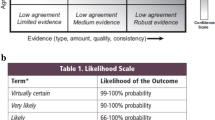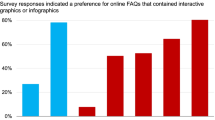Abstract
Authors of the Intergovernmental Panel on Climate Change (IPCC) Fourth Assessment Report (AR4) received guidance on reporting understanding, certainty and/or confidence in findings using a common language, to better communicate with decision makers. However, a review of the IPCC conducted by the InterAcademy Council (2010) found that “the guidance was not consistently followed in AR4, leading to unnecessary errors . . . the guidance was often applied to statements that are so vague they cannot be falsified. In these cases the impression was often left, quite incorrectly, that a substantive finding was being presented.” Our comprehensive and quantitative analysis of findings and associated uncertainty in the AR4 supports the IAC findings and suggests opportunities for improvement in future assessments.

Similar content being viewed by others
Explore related subjects
Discover the latest articles and news from researchers in related subjects, suggested using machine learning.Notes
The first finding presented in the IPCC AR4 SPM uses the term ‘unequivocal,’ which is not a defined term in the Guidance Document. There is no category for expressions of “ignorance,” i.e., situations where uncertainties are simply not known.
We did not accept such uses as “Most likely” or “Uncertain” as indicators of a finding.
The description of uses of measures of uncertainty for WGII references a URL which does not exist http://www.ipcc.ch/activity/uncertaintyguidancenote.pdf (accessed 1-12-11)
Chapter 2 provides a very useful discussion of the history of the subject and choice of methods for this WG. Results presented in Table 1 suggest that only Working Group III (Mitigation) found the IPCC Guidance Note useful to express explicitly their amount of evidence. WGIII defines ‘evidence’ (WGIII-TS, p.34 and Table TS-1) and it is found in the WGIII Glossary but not in other IPCC Glossaries.
WG III TS p.34, see also WGIII-SPM Endnote 1, p.23.
The method WGI used to collapse the four-item, two-dimensional measure of understanding defined in the Guidance Note to a five-level one-dimensional LOSU measure is described in Chapter 2, p. 200 and Table 2.11.
Counts for each WG
This calculation assumes that each finding can be treated independently. If the findings are not independent (e.g., they are cumulative) then this calculation would result in a higher estimate.
References
InterAcademy Council (2010) Review of the IPCC. http://reviewipcc.interacademycouncil.net, p. 36
IPCC (2005) Guidance note for lead authors of the IPCC fourth assessment report on addressing uncertainties. Intergovernmental Panel on Climate Change, Geneva, p 4
Manning MR, Petit M (2003) A concept paper for the AR4 cross cutting theme: uncertainties and risk. In: Manning MR, Petit M, Easterling D, Murphy J, Patwardhan A, Rogner HH, Swart R, Yohe G (eds) IPCC workshop on describing scientific uncertainties in climate change to support analysis of risk and of options: workshop report. Intergovernmental Panel on Climate Change, Geneva
Metz B, Davidson OR, Bosch PR, Dave R, Meyer LA (2007) Contribution of working group III to the fourth assessment report of the Intergovernmental Panel on Climate Change. Cambridge University Press, Cambridge, United Kingdom
Moss R, Schneider S (2000) Uncertainties. In: Pachauri R, Taniguchi T, Tanaka K (eds) Guidance papers on the cross cutting issues of the third assessment report of the IPCC. Intergovernmental Panel on Climate Change, Geneva
PBL Netherlands Environment Agency (2010) Assessing an IPCC assessment: an analysis of statements on projected regional impacts in the 2007 report. http://www.pbl.nl/en/publications/2010/Assessing-an-IPCC-assessment.-An-analysis-of-statements-on-projected-regional-impacts-in-the-2007-report
Pachauri RK, Reisinger A (2007) Climate change 2007: synthesis report. Contribution of working groups I, II and III to the fourth assessment report of the Intergovernmental Panel on Climate Change. Geneva, Switzerland, 104 pp
Parry ML, Canziani OF, Palutikof JP, van der Linden PJ, Hanson CE (2007) Contribution of working group II to the fourth assessment report of the Intergovernmental Panel on Climate Change. Cambridge University Press, Cambridge, United Kingdom
Solomon S, Qin D, Manning M, Chen Z, Marquis M, Averyt KB, Tignor M, Miller HL (2007) Contribution of working group I to the fourth assessment report of the Intergovernmental Panel on Climate Change. Cambridge University Press, Cambridge, United Kingdom
Swart R, Bernstein L, Ha-Duong M, Petersen A (2009) Agreeing to disagree: uncertainty management in assessing climate change, impacts and responses by the IPCC. Clim Chang 92(1–2):1–29. doi:10.1007/s10584-008-9444-7
Acknowledgements
The authors thank Ms. Julia Kalloz (LMI) for supervising the collection and organization of all the IPCC AR4 findings. Ms. Kalloz also performed much of the initial analysis of finding frequency and oversaw indexing and tagging findings with keywords. Ms. Shaun Lehman (Virginia Tech), Ms. Kristen Cleven (Columbia University) and Ms. Rebecca Freeburn (George Washington University) assisted in collecting the IPCC findings while interns at LMI. Ms. Kelli Canada (LMI intern), Mr. Mark Gross (LMI), Mr. Aman Luthra (LMI), Ms. Lia Marroquin (LMI), and Mr. Daniel Jackson (LMI) assisted tagging findings with search terms. Cathy Becker (LMI) advised on frequency analysis. Mr. Greg Wilson (LMI), Mr. David Manzolillo (LMI), Mr. David Shepherd (LMI), and Mr. Reddy Enugu (LMI) developed the web-based version of CliCKE. We wish to acknowledge the support of the LMI Research Institute for multiple grants to develop the CliCKE database, the underlying research and preparation of this manuscript. Ami Nacu-Schmidt aided in the preparation of the manuscript. We thank an anonymous reviewer for useful comments that improved the text.
Author information
Authors and Affiliations
Corresponding author
Electronic supplementary material
Below is the link to the electronic supplementary material.
ESM 1
(DOC 50 kb)
Rights and permissions
About this article
Cite this article
Jonassen, R., Pielke, R. Improving conveyance of uncertainties in the findings of the IPCC. Climatic Change 108, 745 (2011). https://doi.org/10.1007/s10584-011-0185-7
Received:
Accepted:
Published:
DOI: https://doi.org/10.1007/s10584-011-0185-7




